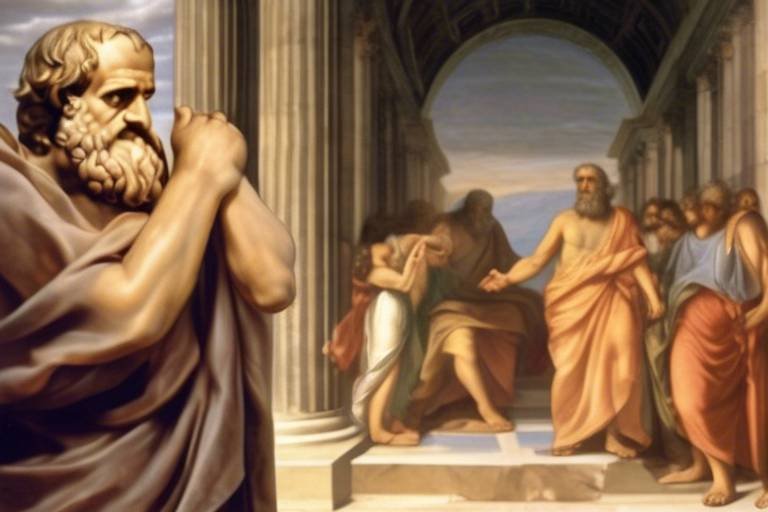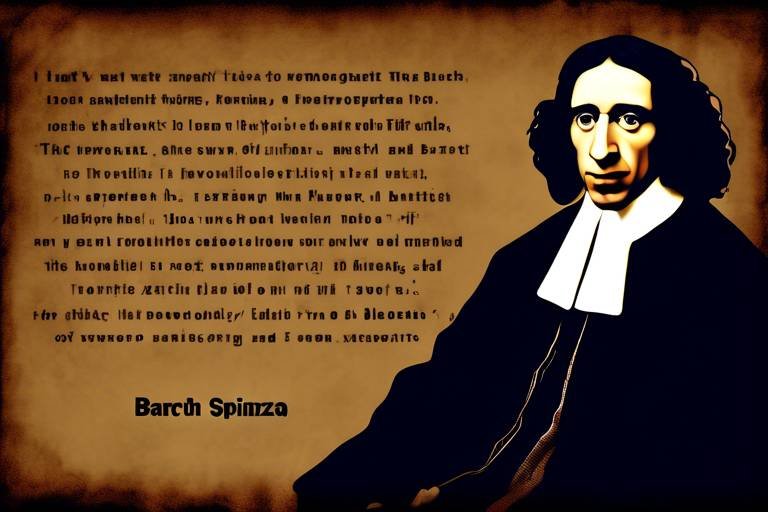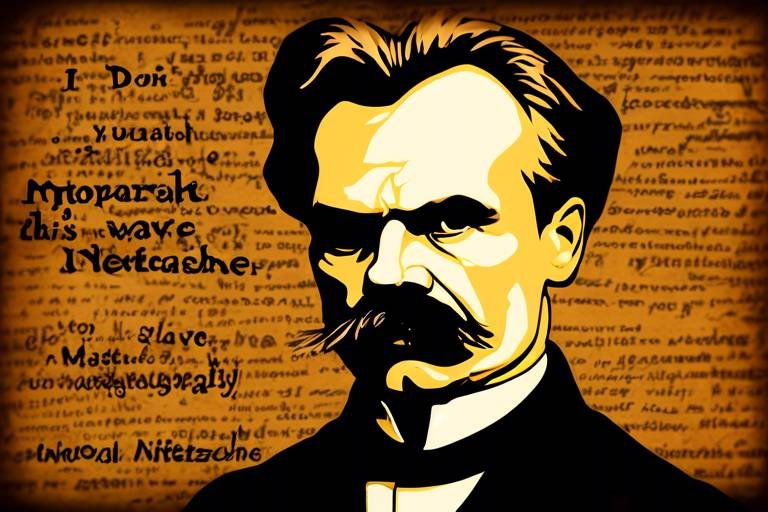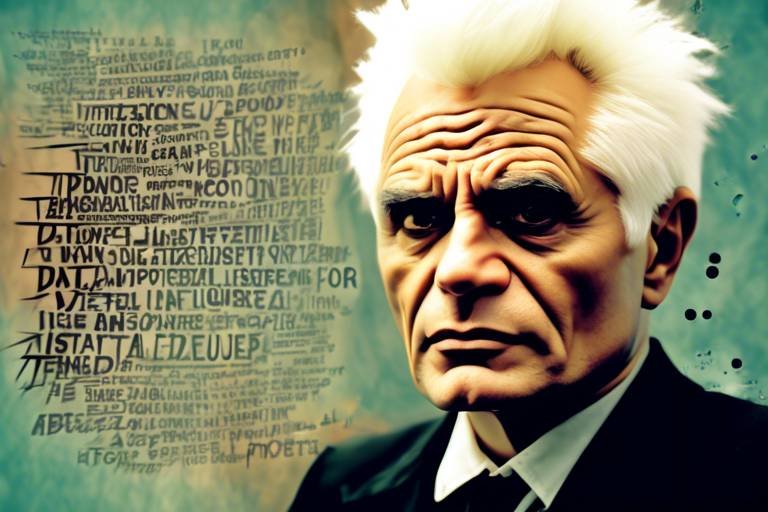The Impact of Plato's Philosophy on Modern Thought
Plato, the ancient Greek philosopher, has left an indelible mark on the landscape of modern thought. His ideas, articulated through dialogues and allegories, continue to resonate across various fields such as philosophy, ethics, politics, and education. In this article, we will explore how the profound insights of Plato not only shaped the intellectual currents of his time but also laid the groundwork for contemporary discourse. From the nature of reality to the intricacies of governance, Plato's philosophy serves as a lens through which we can examine our own beliefs and practices today.
One of the cornerstones of Plato's philosophy is his theory of Forms, which presents a dualistic view of reality. Plato posits that beyond our material world lies a realm of ideals, or Forms, which represent the true essence of all things. This distinction between the tangible and the ideal has sparked countless debates in modern metaphysics regarding existence and perception. For instance, when we question what it means for something to be "real," we often find ourselves echoing Plato's inquiry into the nature of reality. His ideas compel us to consider whether our understanding of the world is merely a shadow of something greater, much like the prisoners in his famous Allegory of the Cave.
Plato's exploration of ethics revolves around the pursuit of the good life, which he believes can only be achieved through the cultivation of virtue and knowledge. His assertion that "virtue is knowledge" suggests that understanding what is good will inherently lead individuals to act in accordance with that goodness. This foundational concept has profoundly influenced modern moral philosophy, shaping ethical frameworks that emphasize the importance of character and moral reasoning. In an age where ethical dilemmas abound, Plato's teachings remind us that the quest for knowledge is not just an academic endeavor but a moral imperative.
Among the many allegories Plato crafted, the Allegory of the Cave stands out as a powerful illustration of his views on enlightenment and ignorance. In this allegory, prisoners are confined to a cave, only able to see shadows cast on a wall, representing a limited understanding of reality. When one prisoner escapes and discovers the outside world, he realizes the depth of his ignorance. This narrative encourages critical thinking and self-awareness, concepts that resonate with modern educational philosophies. In today's world, where misinformation can easily cloud judgment, Plato's allegory serves as a clarion call for individuals to seek knowledge and question their assumptions.
Plato envisioned education as a transformative process aimed at attaining knowledge and virtue. His belief that education should cultivate the mind and character has inspired modern educational systems to prioritize critical thinking and moral development. Many contemporary curricula echo Plato's ideals by encouraging students to engage in dialogue, explore diverse perspectives, and develop their own understanding of ethical principles. This approach not only prepares students for academic success but also equips them to navigate the complexities of life with integrity and wisdom.
Plato's dialectical method, characterized by rigorous questioning and dialogue, remains a cornerstone of contemporary approaches to critical thinking. By promoting the idea that questioning is essential for uncovering truth, Plato laid the groundwork for a culture of inquiry that is vital in various fields today. Whether in academia, politics, or everyday life, the ability to engage in thoughtful debate and challenge assumptions is crucial for personal and societal growth. Plato's influence in this regard is a testament to the enduring relevance of his philosophical methods.
In Plato's vision, the philosopher-king embodies the ideal ruler, one who possesses wisdom and knowledge to govern justly. This concept underscores the importance of wisdom in leadership, a theme that continues to shape modern political theory. As we navigate the complexities of governance today, Plato's insights remind us that ethical leadership is not merely about power but about the responsibility to serve the greater good. This idea has sparked discussions about the qualities we seek in our leaders and the moral obligations they hold towards their constituents.
Plato's works, particularly The Republic, delve into the intricacies of justice and the ideal state. His exploration of these themes has profoundly influenced modern political thought, prompting discussions about democracy, governance, and civic responsibility. Plato's vision of a just society, where individuals contribute to the common good, has inspired contemporary debates on social justice and the role of institutions in fostering equality.
Plato's conception of justice as harmony within society continues to resonate in contemporary discussions on social justice and equality. He argues that a just society is one where each individual plays their appropriate role, contributing to the overall balance. This idea challenges us to consider how our own societal structures promote or hinder justice and equality. As we grapple with issues such as systemic inequality and social unrest, Plato's insights serve as a guiding light, urging us to strive for a society that reflects harmony and fairness.
While Plato's skepticism towards democracy may seem counterintuitive in today's democratic societies, it prompts critical discussions about the effectiveness of democratic systems. His cautionary stance encourages us to evaluate the principles and practices of democracy, questioning whether they truly serve the interests of the populace. By reflecting on Plato's critiques, we can engage in meaningful dialogues about the nature of governance and the responsibilities of citizens within a democratic framework.
- What is Plato's theory of Forms?
Plato's theory of Forms posits that beyond our physical world lies a realm of ideal forms, representing the true essence of all things. This dualistic view has influenced modern metaphysical discussions about reality and existence.
- How does Plato's philosophy influence modern ethics?
Plato emphasized the pursuit of virtue and knowledge as essential to living a good life, laying the groundwork for contemporary moral philosophy and ethical frameworks that prioritize character and moral reasoning.
- What is the significance of the Allegory of the Cave?
This allegory illustrates the journey from ignorance to enlightenment, encouraging critical thinking and self-awareness, which are vital in modern education and personal development.
- How does Plato's political philosophy affect modern governance?
Plato's idea of the philosopher-king highlights the importance of wisdom in leadership, influencing modern political theory and discussions about ethical governance and civic responsibility.

The Nature of Reality
Plato's philosophy is a treasure trove of insights that delve into the very essence of existence. At the heart of his thought lies the theory of Forms, a groundbreaking concept that distinguishes between the material world we perceive with our senses and the realm of ideals that embodies the true essence of things. Imagine walking through a garden filled with beautiful flowers; what you see are mere shadows of their perfect forms. This dualistic view has profoundly influenced modern metaphysical discussions, prompting us to question what is real and what is merely an illusion.
In Plato's world, the Forms are unchanging, eternal truths that exist beyond our physical reality. For instance, the Form of a chair is the perfect idea of 'chairness' that no actual chair can fully encapsulate. This leads us to ponder: if our perceptions are flawed, how can we ever grasp the true nature of existence? This question resonates deeply in contemporary philosophy, where thinkers grapple with concepts of existence, perception, and the nature of reality itself.
Moreover, Plato's allegorical narratives, like the famous Allegory of the Cave, serve as a metaphor for enlightenment and ignorance. In this allegory, prisoners are chained inside a cave, only able to see shadows cast on a wall. When one prisoner escapes and sees the world outside, he realizes that the shadows are mere reflections of reality, not the truth itself. This powerful image compels us to reflect on our own lives: how often do we mistake appearances for reality? Plato's insights encourage us to seek deeper understanding and challenge our perceptions, a notion that resonates with modern discussions on epistemology—the study of knowledge and belief.
In today's world, the implications of Plato's dualistic view extend beyond philosophy into fields like science, psychology, and even art. For example, in science, the distinction between observable phenomena and underlying principles mirrors Plato's theory of Forms. Similarly, in psychology, the exploration of consciousness invites comparisons to Plato's ideas about the mind's ability to grasp higher truths beyond sensory experience.
Ultimately, Plato's exploration of the nature of reality invites us to engage in a critical examination of our own beliefs and perceptions. It urges us to ask ourselves: Are we living in the shadows, or are we brave enough to step into the light of true understanding? This quest for deeper knowledge not only shapes our philosophical inquiries but also influences our everyday lives, prompting us to seek truth in a world often clouded by illusion.

Ethics and Morality
When we dive into the realm of ethics and morality, we can’t help but encounter the profound impact of Plato's ethical theories. At the heart of his philosophy lies the belief that the pursuit of the good life is intertwined with virtue and knowledge. Imagine living in a world where your decisions are guided not just by personal gain but by a deeper understanding of what it means to be good. Plato argued that true knowledge leads to virtue, and virtue, in turn, leads to a fulfilling life. This idea resonates strongly in our modern ethical frameworks, where the quest for a meaningful existence often revolves around moral principles.
Plato's approach to ethics is not just theoretical; it’s practical and profoundly relevant today. He believed that by cultivating virtues such as courage, wisdom, and temperance, individuals could achieve a harmonious life. This notion leads us to ask ourselves: are we striving for these virtues in our daily lives? Are our actions aligned with our understanding of what is good? These questions echo through time, prompting us to reflect on our ethical choices.
To better understand Plato's influence on modern ethics, let's consider some key concepts he introduced:
- The Good Life: Plato emphasized that the ultimate goal of human existence is to attain the good life, where happiness is achieved through moral integrity.
- Knowledge as Virtue: He posited that knowledge is not just about facts but about understanding the essence of goodness, which guides moral behavior.
- Ethical Relativism vs. Absolutism: Plato's ideals challenge the notion of ethical relativism, suggesting that there are universal truths about morality that transcend cultural differences.
These concepts have laid the groundwork for many modern ethical theories. For instance, utilitarianism and deontology often draw from Plato's ideals, emphasizing the significance of moral reasoning in decision-making. In a world where ethical dilemmas abound, Plato's insistence on the pursuit of knowledge as a pathway to virtue provides a guiding light, urging us to seek deeper understanding before acting.
Moreover, Plato's ethical framework encourages us to develop a sense of self-awareness. He believed that individuals must engage in critical self-reflection to understand their motivations and the consequences of their actions. This idea is particularly relevant today, as we navigate a complex landscape of moral choices influenced by technology, culture, and societal norms. By fostering self-awareness, we can better align our actions with our values, leading to a more ethical society.
In summary, Plato's contributions to ethics and morality are not merely historical footnotes; they are vibrant threads woven into the fabric of modern philosophical discourse. His emphasis on virtue, knowledge, and the good life continues to inspire individuals and societies to strive for a better understanding of what it means to live ethically. As we grapple with contemporary moral challenges, Plato's insights remind us that the journey towards ethical living is ongoing and requires both reflection and action.
Q: How does Plato's view of ethics differ from modern ethical theories?
A: While modern ethical theories often focus on the consequences of actions (like utilitarianism) or adherence to rules (like deontology), Plato emphasizes the importance of virtue and knowledge as foundational to ethical behavior.
Q: Can Plato's ideas still be applied to today's ethical dilemmas?
A: Absolutely! Plato's emphasis on self-awareness and the pursuit of the good life encourages critical thinking and moral reasoning, making his ideas relevant in addressing contemporary issues.
Q: What role does education play in Plato's ethical framework?
A: Education is crucial in Plato's philosophy, as it is the means through which individuals can attain knowledge and virtue, ultimately leading to a more ethical society.

The Allegory of the Cave
Plato's Allegory of the Cave is one of the most powerful metaphors in Western philosophy, and it serves as a profound illustration of his views on enlightenment and ignorance. Imagine a group of prisoners who have been chained inside a dark cave for their entire lives, only able to see the shadows cast on the wall in front of them. These shadows are the only reality they know, representing a distorted perception of the world around them. This scenario sparks a crucial question: how many of us are living in our own caves, unaware of the deeper truths that lie beyond our immediate perceptions?
The allegory suggests that most people are like those prisoners, confined to a limited understanding of reality. When one prisoner is freed and ventures outside the cave, he is initially blinded by the sunlight, symbolizing the discomfort and confusion that often accompany the pursuit of knowledge. However, as his eyes adjust, he begins to see the world in its true form—vivid colors, intricate details, and the beauty of nature. This journey from darkness to light represents the transformative power of education and personal growth.
In modern educational philosophies, the allegory resonates deeply. It encourages students to challenge their assumptions and seek knowledge beyond the surface. Just as the freed prisoner returns to the cave to enlighten his fellow prisoners, educators today are tasked with fostering critical thinking and self-awareness among their students. They must guide them out of their metaphorical caves, encouraging a quest for truth that transcends the shadows of ignorance.
Moreover, the allegory serves as a reminder of the importance of self-awareness. In our fast-paced world, it's easy to become complacent, accepting information at face value without questioning its validity. Plato's allegory compels us to engage in rigorous self-reflection and critical inquiry, prompting us to ask: Are we truly seeing the world as it is, or are we merely observing shadows?
To further illustrate the implications of this allegory, consider the following points:
- Critical Thinking: The allegory emphasizes the need for individuals to develop their critical thinking skills, allowing them to question and analyze the information presented to them.
- Personal Growth: It highlights the journey of self-discovery and the importance of stepping out of one’s comfort zone to gain a broader perspective.
- Social Responsibility: The freed prisoner’s return to the cave symbolizes the responsibility of those who have gained knowledge to share it with others, fostering a more informed society.
In conclusion, Plato's Allegory of the Cave remains a timeless metaphor that challenges us to seek enlightenment and embrace the complexities of reality. It serves as a call to action for individuals to break free from their chains of ignorance and strive for a deeper understanding of the world. By doing so, we not only enrich our own lives but also contribute to the collective knowledge and wisdom of society.
What is the main message of the Allegory of the Cave?
The main message is that most people live in ignorance, perceiving only shadows of reality. True knowledge and enlightenment require a journey beyond these shadows.
How does the Allegory of the Cave relate to modern education?
It emphasizes the importance of critical thinking and encourages students to question their assumptions and seek deeper truths beyond surface-level understanding.
Why is self-awareness important according to Plato?
Self-awareness allows individuals to recognize their limitations and biases, fostering personal growth and a more accurate understanding of reality.

Implications for Education
Plato’s vision of education is not just about rote memorization or passing exams; it’s a profound journey towards achieving knowledge and virtue. He believed that education should be transformative, shaping individuals into enlightened citizens capable of contributing meaningfully to society. This idea resonates deeply in modern educational philosophies, where the focus has shifted from mere information delivery to fostering critical thinking and ethical reasoning.
In contemporary classrooms, the influence of Plato's ideas can be seen in various ways. For instance, educators are increasingly emphasizing the importance of critical thinking skills over traditional memorization. This shift is pivotal because it encourages students to question assumptions, analyze information, and engage in thoughtful discussions, much like the dialectical method Plato championed. Imagine a classroom where students are not just passive recipients of knowledge but active participants in their learning journey, challenging ideas and exploring new concepts collaboratively.
Moreover, Plato’s belief in the importance of moral development in education is reflected in curricula that integrate ethics and character education. Schools today often strive to cultivate virtues such as honesty, respect, and empathy, recognizing that educating the mind without nurturing the heart can lead to a disconnection from societal values. This holistic approach aims to produce well-rounded individuals who are not just academically proficient but also socially responsible.
Another significant implication of Plato's educational philosophy is the recognition of different learning styles and the need for personalized education. Just as Plato tailored his teachings to the needs of his students, modern educators are increasingly adopting differentiated instruction methods to accommodate diverse learning preferences. In this context, technology plays a vital role, providing tools that allow for customized learning experiences. For instance, online platforms enable students to learn at their own pace, exploring subjects that ignite their passions.
To further illustrate the impact of Plato's educational theories, consider the following table that summarizes key aspects of his philosophy and their modern implications:
| Plato's Educational Philosophy | Modern Implications |
|---|---|
| Emphasis on critical thinking | Encouragement of inquiry-based learning and problem-solving skills |
| Moral and ethical development | Integration of character education in school curricula |
| Personalized learning | Adoption of differentiated instruction and technology in education |
| Dialectical method | Promotion of dialogue and debate in classrooms |
Ultimately, Plato’s educational ideals challenge us to rethink our approach to teaching and learning. They urge educators to create environments where students are not just passive learners but active thinkers, equipped to navigate the complexities of the modern world. By embracing these principles, we can cultivate a generation of individuals who are not only knowledgeable but also wise, compassionate, and ready to contribute positively to society.
- What is the main focus of Plato's educational philosophy? Plato emphasized the importance of critical thinking, moral development, and the pursuit of knowledge as a means to achieve virtue.
- How does Plato's philosophy influence modern education? His ideas encourage inquiry-based learning, ethical education, and personalized learning experiences tailored to individual student needs.
- Why is critical thinking important in education? Critical thinking allows students to analyze information, question assumptions, and engage in meaningful discussions, preparing them for real-world challenges.
- What role does technology play in education today? Technology facilitates personalized learning and provides resources that cater to different learning styles, enhancing the educational experience.

Influence on Critical Thinking
When we talk about critical thinking, it's hard to ignore the profound impact that Plato's dialectical method has had on how we engage with ideas today. Plato believed that the path to knowledge was paved with questions, not answers. His approach encourages us to dig deeper, to challenge assumptions, and to engage in meaningful dialogue. This is not just an ancient philosophy; it’s a skill set that is increasingly vital in our modern world, where information is abundant but wisdom is scarce.
Imagine walking into a room filled with people discussing a complex issue. Instead of nodding along, what if you were to ask questions like, "What do we really mean by that?" or "How do we know this is true?" This is the essence of Plato’s influence—encouraging us to be active participants in our own learning and understanding. His method, known as the dialectic, is a process of dialogue where ideas are tested against one another, leading to clearer insights and deeper understanding.
In contemporary education, this approach has manifested in various ways. For instance, many classrooms now emphasize Socratic questioning, a technique that stems directly from Plato's teachings. This method not only fosters a more engaging learning environment but also equips students with the ability to think critically about the information presented to them. It’s like giving them a toolkit for intellectual exploration. Here are some key aspects of how Plato’s influence is woven into modern critical thinking:
- Encouragement of Inquiry: Students are encouraged to ask questions and explore different viewpoints, leading to a richer understanding of the topic.
- Dialogue Over Monologue: Class discussions promote the exchange of ideas, where students learn from one another, reflecting Plato’s belief in the power of conversation.
- Challenging Assumptions: By questioning the status quo, students learn to identify biases and assumptions in both their thinking and the information they encounter.
Moreover, Plato's teachings extend beyond the classroom. In the workplace, for instance, critical thinking skills are essential for problem-solving and decision-making. Companies are increasingly valuing employees who can navigate complex issues, think independently, and communicate effectively. This shift echoes Plato's vision of the philosopher as a wise leader, capable of guiding others through the fog of uncertainty.
In summary, the influence of Plato on critical thinking is both profound and enduring. His dialectical method serves as a beacon, guiding us toward a more thoughtful and engaged way of interacting with the world. As we embrace these principles, we not only honor Plato's legacy but also empower ourselves and future generations to think critically, question boldly, and engage deeply with the complexities of life.
- What is Plato's dialectical method? Plato's dialectical method is a form of dialogue that emphasizes questioning and critical discussion to arrive at deeper truths.
- How can I apply Plato's ideas to my daily life? You can apply his ideas by actively questioning assumptions, engaging in meaningful conversations, and seeking out diverse perspectives.
- Why is critical thinking important today? In an age of information overload, critical thinking helps us discern truth from misinformation and make informed decisions.

The Role of the Philosopher
Plato’s concept of the philosopher-king is not just a whimsical idea; it’s a profound assertion that wisdom should guide governance. Imagine a world where leaders are not only elected for their popularity but also for their understanding of ethics, justice, and the complexities of human nature. Plato believed that those who govern should possess a deep knowledge of the Forms, particularly the Form of the Good. This isn’t just academic knowledge; it’s a transformative understanding that shapes how leaders interact with their citizens and make decisions that affect society as a whole.
In today’s context, the philosopher’s role extends beyond the realm of politics into various fields such as business, education, and even technology. The idea is that individuals who engage in philosophical thinking can analyze situations critically and make informed decisions. This approach fosters a culture where questioning the status quo is not only encouraged but seen as essential for progress. The philosopher’s role, therefore, becomes one of a guide, urging society to strive for a deeper understanding of justice, ethics, and the common good.
Moreover, Plato’s emphasis on the philosopher’s knowledge can be seen in modern leadership models. For instance, many contemporary leaders are now expected to have a strong ethical foundation, as this is crucial for gaining the trust of their constituents. The philosopher-king concept challenges us to consider: Are our leaders wise enough to navigate the complexities of modern governance? Are they equipped to handle the moral dilemmas that arise in a rapidly changing world?
To further illustrate the relevance of Plato’s ideas, let’s consider the following table that highlights the key qualities of a philosopher-king and their modern counterparts:
| Qualities of a Philosopher-King | Modern Leadership Qualities |
|---|---|
| Wisdom | Emotional Intelligence |
| Knowledge of the Good | Ethical Decision-Making |
| Commitment to Justice | Social Responsibility |
| Ability to Question | Critical Thinking Skills |
In essence, the philosopher’s role is not confined to ancient texts or theoretical discussions. It is a living, breathing concept that continues to evolve and adapt to the needs of society. By embracing the qualities of the philosopher-king, modern leaders can foster environments that prioritize wisdom, justice, and ethical governance. This aligns with Plato's vision of a society where the most knowledgeable and virtuous individuals guide the community towards a better future.
- What is a philosopher-king? A philosopher-king is a ruler who possesses both a love of wisdom and the ability to govern justly, as described by Plato in his work, "The Republic."
- How does Plato's philosophy influence modern leadership? Plato's emphasis on wisdom and ethical governance encourages contemporary leaders to prioritize knowledge and virtue in their decision-making processes.
- Why is critical thinking important in leadership? Critical thinking allows leaders to analyze complex situations, question assumptions, and make informed decisions that benefit society.

Political Philosophy
Plato's works, particularly The Republic, delve deep into the essence of justice and the ideal state, laying the groundwork for modern political thought. His philosophical explorations raise questions that are as relevant today as they were in ancient Greece. Plato argues that a just society is one where each individual plays their appropriate role, contributing to the overall harmony of the community. This concept of a structured society, where everyone has a purpose, resonates with contemporary discussions about social roles and responsibilities.
One of the most compelling aspects of Plato's political philosophy is the notion of the philosopher-king. Imagine a ruler who is not only wise but also virtuous, someone who seeks the common good rather than personal gain. This idea challenges the status quo of political leadership and raises the bar for what we expect from our leaders. In a world where political corruption often seems rampant, Plato’s vision serves as a beacon, urging us to reconsider the qualities we value in governance. His emphasis on wisdom in leadership has inspired countless political theories and models, prompting a reevaluation of what it means to govern ethically.
Moreover, Plato's skepticism towards democracy is particularly striking. He believed that the masses, driven by emotion and ignorance, might make poor decisions that could lead to societal chaos. This perspective encourages us to critically examine our democratic systems today. Are we truly equipped to make informed choices, or are we swayed by populism and rhetoric? Plato's concerns prompt modern scholars and citizens alike to engage in discussions about the effectiveness of democratic practices and the importance of informed voting.
In the context of modern governance, Plato's ideas can be summarized in the following key points:
- Justice as Harmony: Plato defines justice as a balance where everyone fulfills their role, which has implications for how we view social justice today.
- Philosopher-King: The ideal ruler should possess wisdom and virtue, setting a standard for leadership that prioritizes the common good.
- Skepticism of Democracy: His doubts about the capability of the masses to govern themselves challenge us to think critically about our democratic institutions.
Ultimately, Plato's political philosophy invites us to reflect on our values and the structures that govern our lives. It encourages a dialogue about the nature of justice, the qualities of effective leadership, and the responsibilities of citizenship. In a world where political ideologies are often polarized, revisiting Plato's insights can provide a fresh perspective on the complexities of governance and societal well-being.
- What is the main idea of Plato's political philosophy?
Plato's political philosophy centers around the concept of justice as harmony within society, emphasizing the need for wise and virtuous leadership, particularly through the idea of the philosopher-king.
- How does Plato view democracy?
Plato is skeptical of democracy, believing that the masses may be swayed by emotion and ignorance, which could lead to poor decision-making and societal chaos.
- What relevance does Plato's philosophy have today?
Plato's ideas continue to influence modern political thought, prompting discussions on social justice, the qualities of leadership, and the effectiveness of democratic practices.

The Republic,
This article explores the profound influence of Plato's ideas on contemporary philosophy, ethics, politics, and education, highlighting how his theories continue to shape modern intellectual discourse.
Plato's theory of Forms presents a dualistic view of reality, distinguishing between the material world and the realm of ideals, which has influenced modern metaphysical discussions on existence and perception.
Plato's ethical theories emphasize the pursuit of the good life through virtue and knowledge, laying foundational concepts that continue to inform modern moral philosophy and ethical frameworks.
This allegory illustrates Plato's views on enlightenment and ignorance, encouraging critical thinking and self-awareness, concepts that resonate with modern educational philosophies and personal development.
Plato's vision of education as a means to attain knowledge and virtue has inspired modern educational systems, emphasizing the importance of critical thinking and moral development in curricula.
Plato's dialectical method promotes rigorous questioning and dialogue, principles that underpin contemporary approaches to critical thinking and debate in various fields.
Plato's idea of the philosopher-king highlights the importance of wisdom in governance, influencing modern political theory and the discourse around leadership and ethical governance.
Plato's works, particularly The Republic, address justice and the ideal state, shaping modern political thought and discussions about democracy, governance, and civic responsibility.
Plato's conception of justice as harmony within society continues to influence contemporary debates on social justice, equality, and the role of institutions in achieving a just society.
Plato's skepticism towards democracy prompts critical discussions on the effectiveness of democratic systems, influencing modern political philosophy and the evaluation of democratic practices worldwide.
The Republic stands as one of Plato's most significant works, diving deep into the nature of justice and the ideal state. In this dialogue, Socrates engages with various Athenians, exploring the concept of justice not just as a personal virtue but as a foundational element of a well-ordered society. Imagine a world where everyone plays their role harmoniously, like a perfectly tuned orchestra. Plato believed that just as each musician must know their part, each citizen must understand their role within the state to achieve societal harmony.
One of the key ideas presented in The Republic is the notion of the "philosopher-king." Plato argues that the most just and effective rulers are those who possess both wisdom and virtue. This concept challenges the traditional views of leadership, suggesting that true governance requires knowledge and moral integrity, rather than mere popularity or power. It's a radical idea that continues to resonate today, especially when we consider the qualities we seek in our leaders.
Furthermore, Plato introduces the concept of the "noble lie," a myth or untruth that serves a social purpose, which he believes is necessary for maintaining societal order. This raises intriguing questions about the ethics of governance and the lengths to which leaders might go to preserve harmony. Is it acceptable for leaders to manipulate truths for the greater good? This dilemma remains relevant in today's political landscape, where the line between truth and propaganda often blurs.
In terms of structure, The Republic is not just a philosophical treatise; it's a blueprint for a society built on justice. Plato outlines a tripartite class system consisting of rulers, auxiliaries, and producers, each with distinct roles and responsibilities. This division mirrors the human soul's tripartite structure, comprising reason, spirit, and appetite. Just as a balanced soul leads to a virtuous individual, a balanced society leads to a just state.
Ultimately, the lessons from The Republic are profound and multifaceted. They challenge us to think critically about the nature of justice, the qualities of effective leadership, and the structure of our societies. As we navigate the complexities of modern governance and ethics, Plato's insights continue to serve as a guiding light, prompting us to reflect on our values and the kind of society we wish to build.
- What is the main idea of Plato's Republic?
The main idea centers around the definition of justice and the organization of an ideal state, advocating for philosopher-kings as the best rulers.
- How does Plato's theory of Forms relate to modern philosophy?
Plato's theory of Forms distinguishes between the material world and abstract ideals, influencing contemporary metaphysical discussions about existence and reality.
- What relevance does the Allegory of the Cave have today?
The Allegory of the Cave encourages critical thinking and self-awareness, principles that are essential in modern education and personal growth.

address justice and the ideal state, shaping modern political thought and discussions about democracy, governance, and civic responsibility.
Plato’s conception of justice is not merely a theoretical construct; it serves as a cornerstone for understanding the ideal state. In his seminal work, The Republic, he articulates a vision of a society where justice is achieved through a harmonious balance of various classes, each fulfilling their roles effectively. This idea resonates deeply with modern political thought, as it challenges us to consider what justice truly means in the context of our own societies. Are we, as citizens, contributing to a state that reflects justice, or are we merely spectators in a system that often seems unjust?
Plato famously posits that justice is akin to a well-tuned musical harmony, where each part of society plays its role in a coordinated manner. This metaphor invites us to reflect on our own societal structures. Just as a symphony requires different instruments to create beautiful music, a society needs diverse roles—workers, soldiers, and philosophers—to function optimally. The implications of this analogy extend into modern discussions on governance and civic responsibility, urging us to recognize the interconnectedness of our roles within the state.
Furthermore, Plato’s ideal state is characterized by the philosopher-king, a ruler who possesses both wisdom and virtue. This notion raises important questions about leadership in contemporary governance. Are our leaders equipped with the knowledge and moral compass necessary to guide society toward justice? The philosopher-king serves as a reminder that effective governance requires more than just popularity; it demands a deep understanding of justice, ethics, and the common good.
In today’s world, where political systems often face scrutiny for their effectiveness, Plato's exploration of justice encourages us to engage in critical discussions about our own democratic practices. For instance, how do we ensure that our institutions reflect the ideals of justice that Plato so passionately advocated? This inquiry leads us to evaluate the roles of various stakeholders—government officials, citizens, and civil society—in shaping a just society. By fostering a culture of civic responsibility, we can work towards a political environment that embodies the principles of justice.
Moreover, Plato’s skepticism towards the masses in The Republic prompts us to critically assess the foundations of our democratic systems. While democracy is often hailed as the pinnacle of governance, Plato's concerns about the potential for mob rule highlight the need for informed and engaged citizenry. How can we cultivate a society where citizens are not only voters but also informed participants in the democratic process? This question remains pivotal as we navigate the complexities of modern governance.
Ultimately, Plato’s ideas on justice and the ideal state continue to shape contemporary political discourse. They compel us to reflect on the nature of our own societies and challenge us to strive for a more just and equitable world. The dialogue surrounding justice is not static; it evolves as we confront new challenges and opportunities in governance. As we engage with these ideas, we can work towards creating systems that not only aspire to justice but actively embody it in practice.
- What is Plato's definition of justice? Plato defines justice as a harmony where each part of society fulfills its role effectively, contributing to the overall good.
- How does Plato's ideal state influence modern governance? His ideas encourage us to consider the importance of knowledgeable and virtuous leaders and the need for civic responsibility in democracy.
- Why is the philosopher-king significant in Plato's philosophy? The philosopher-king symbolizes the ideal ruler who possesses wisdom and virtue, essential for just governance.
- What lessons can we learn from Plato's skepticism towards democracy? Plato's concerns remind us of the importance of informed and engaged citizens in sustaining a healthy democratic system.

Justice and the Ideal State
When we dive into Plato's conception of justice, we find a profound exploration of what it means to create an ideal state. In his seminal work, The Republic, Plato argues that justice is not merely a legalistic concept but rather a fundamental principle that governs the harmony of society. Imagine a well-tuned orchestra, where each instrument plays its part in perfect synchrony; this is how Plato envisions a just society. He posits that for a state to be truly just, its citizens must fulfill their roles according to their natural abilities and virtues.
Plato delineates three distinct classes within his ideal society: the rulers, the auxiliaries, and the producers. Each class has a specific function, and justice occurs when each class performs its role without overstepping its boundaries. The rulers, or philosopher-kings, are tasked with governance, guided by wisdom and knowledge. The auxiliaries serve as the protectors of the state, while the producers handle the economic aspects, ensuring that the community's needs are met. This division is critical because it reflects Plato's belief that justice is about balance and order.
In contemporary discussions, Plato's ideas resonate strongly with ongoing debates about social justice and equality. For instance, we often hear about the need for systemic reforms to address inequities in wealth and opportunity. Plato’s vision can be seen as a precursor to these modern discourses, emphasizing that a just society must consider the well-being of all its members. His notion of justice as harmony suggests that true societal progress can only be achieved when every individual, regardless of their class, has the opportunity to contribute to the common good.
Moreover, Plato's emphasis on the role of education in achieving justice cannot be overlooked. He believed that educating citizens to understand their roles and the principles of justice is essential for maintaining societal harmony. In today’s context, this translates into the importance of civic education and the cultivation of a sense of responsibility among citizens. It prompts us to ask: Are our educational systems adequately preparing individuals to participate in a just society?
To further illustrate Plato's ideas on justice and the ideal state, we can consider the following table that contrasts Plato's vision with modern interpretations of justice:
| Aspect | Plato's Vision | Modern Interpretation |
|---|---|---|
| Definition of Justice | Harmony and balance among classes | Equity and fairness for all individuals |
| Role of Education | Essential for understanding one’s role | Critical for fostering informed citizens |
| Governance | Philosopher-kings leading with wisdom | Democratic leaders accountable to the people |
Ultimately, Plato's exploration of justice and the ideal state invites us to reflect on our own societal structures. Are we creating environments where justice thrives? Are we ensuring that every individual has the opportunity to contribute meaningfully? These questions remain as relevant today as they were in ancient Greece, reminding us that the pursuit of justice is an ongoing journey.
- What is Plato's definition of justice? Plato defines justice as a harmony achieved when each class in society performs its designated role.
- How does Plato's ideal state compare to modern democracies? While Plato advocates for philosopher-kings, modern democracies emphasize elected leaders accountable to the populace.
- What role does education play in Plato's philosophy? Education is crucial for individuals to understand their roles and contribute to a just society.

Impact on Democracy
Plato's skepticism towards democracy is a fascinating aspect of his philosophy that continues to spark debate in modern political thought. He viewed democracy as a system that, while seemingly fair, could easily devolve into chaos and tyranny. This perspective is especially relevant today as we navigate the complexities of democratic governance around the world. Plato believed that the masses, driven by emotion rather than reason, might elect leaders who are unqualified or even detrimental to society. Isn't it intriguing how this ancient critique resonates with contemporary issues we see in various democratic systems?
In his work, The Republic, Plato expressed concern over the potential for demagogues to rise to power by appealing to the emotions of the populace. This idea prompts us to consider the following questions: Are we, as citizens, making informed choices when we cast our votes? Or are we swayed by rhetoric that lacks substance? Plato's insights push us to reflect on the quality of our democratic processes, urging us to prioritize informed decision-making over mere popularity.
Moreover, Plato's vision of an ideal state—governed by philosopher-kings—challenges us to rethink the qualities we seek in our leaders. He argued that only those who possess true knowledge and wisdom should wield power. This notion raises critical discussions about the qualifications and ethical standards expected of our leaders today. Are we settling for mediocrity in leadership when we should be demanding excellence? The implications of Plato's philosophy can be seen in movements advocating for more educated and morally grounded leaders in our political systems.
To further illustrate Plato's impact on modern democracy, consider the following points:
- Critical Evaluation of Democratic Practices: Plato's skepticism encourages a thorough examination of how democracy functions today, prompting discussions about voter education and engagement.
- Role of the Educated Elite: His idea of philosopher-kings suggests that an educated elite could better serve the public, leading to debates about elitism versus populism in governance.
- Social Responsibility: Plato's emphasis on the collective good reminds us of the responsibilities that come with democratic rights, urging citizens to engage thoughtfully in civic life.
In conclusion, Plato's reflections on democracy are not merely historical critiques but are deeply relevant to our current political landscape. His ideas challenge us to foster a more informed electorate, to seek leaders who exemplify wisdom and virtue, and to engage in continuous dialogue about the ideals of justice and governance. As we ponder the future of democracy, we would do well to heed the lessons from this ancient philosopher, ensuring that our democratic practices evolve in a manner that truly serves the common good.
- What was Plato's main critique of democracy? Plato believed that democracy could lead to the election of unqualified leaders driven by emotion rather than reason, resulting in chaos.
- How does Plato's idea of philosopher-kings apply to modern governance? His concept suggests that educated and wise individuals should lead, prompting discussions about the importance of qualifications in political leadership.
- Why is Plato's philosophy still relevant today? His insights encourage critical thinking about democratic processes, voter engagement, and the qualities we value in our leaders.
Frequently Asked Questions
- What is Plato's theory of Forms?
Plato's theory of Forms posits that beyond our material world, there exists a realm of ideal forms or ideas that represent the true essence of things. This dualistic view has significantly influenced modern metaphysical discussions about reality and perception.
- How does Plato's philosophy impact modern ethics?
Plato emphasized the pursuit of the good life through virtue and knowledge, laying the groundwork for modern moral philosophy. His ideas encourage individuals to seek wisdom and ethical behavior, which remain central to contemporary discussions on morality.
- What is the significance of the Allegory of the Cave?
The Allegory of the Cave illustrates the journey from ignorance to enlightenment. It encourages individuals to question their perceptions and seek deeper understanding, a concept that resonates with modern educational philosophies focused on critical thinking and self-awareness.
- How has Plato influenced modern education?
Plato's vision of education as a means to attain knowledge and virtue has inspired contemporary educational systems. His emphasis on critical thinking and moral development is reflected in curricula that aim to cultivate well-rounded individuals.
- What is the role of the philosopher according to Plato?
Plato's idea of the philosopher-king suggests that those who govern should possess wisdom and knowledge. This concept has shaped modern political theory, emphasizing the importance of ethical governance and informed leadership.
- How does Plato's view on justice influence modern political thought?
Plato's conception of justice as harmony within society continues to impact contemporary discussions on social justice, equality, and the role of institutions. His ideas prompt critical evaluation of how societies can achieve a just and equitable state.
- What is Plato's skepticism about democracy?
Plato was critical of democracy, believing that it could lead to chaos and poor governance. His skepticism has influenced modern political philosophy, prompting ongoing debates about the effectiveness and challenges of democratic systems worldwide.



















